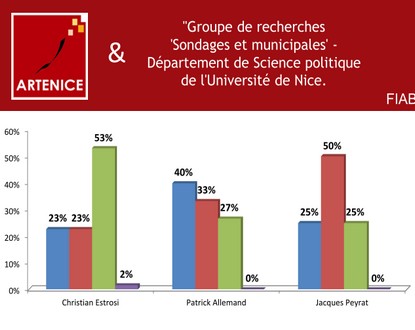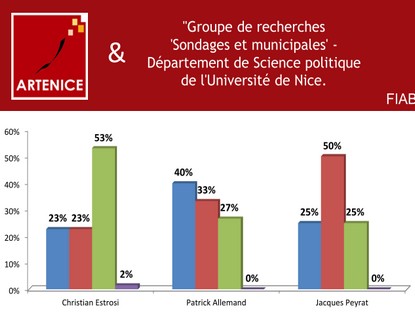The release of the CSA poll on March 3rd provoked some “acidic” comments following the announcement of an electoral result that has not yet occurred.
 The criticisms are driven by the failure to clearly specify that any poll (which is just a snapshot at a given moment) has a margin of error that can be significant (+/- 4%, creating an 8% difference between the two extremes) and that uncertainty is also a corrective factor.
The criticisms are driven by the failure to clearly specify that any poll (which is just a snapshot at a given moment) has a margin of error that can be significant (+/- 4%, creating an 8% difference between the two extremes) and that uncertainty is also a corrective factor.
Of course, in this case, caution and a sense of responsibility suggest that a question mark should cast doubt on a certain truth!
However, when the goal is to create a mobilizing or demobilizing dynamic (a bandwagon effect in technical terms), certain rules remain in the drawer…
It is with particular interest that we publish the essence of this report so that our readers are properly informed to thus be fully responsible voters.
According to Frédéric Ganneval, co-founder of Artenice who conducted this study: “With less than three weeks until the first round of municipal elections, it is tempting to question voters on the candidates they intend to choose. This temptation is all the more appealing as the campaign intensifies, campaign teams double their activity, and voting intention polls have become tools for dramatizing the political debate.
However, if the regularity of polls makes upcoming municipal and community elections more visible, few highlight the fragility of voting intentions and attest to the perilous task of establishing an order of arrival, or even announcing the probable winner of a contest that has not yet taken place (especially in the second round).
The risk does not lie so much in acting as an oracle for a yet-to-come competition or influencing wavering voters, who appear to be less interested in politics than the rest of the population and more represented among younger voters.
The risk is more certainly observed in the feat of portraying political choices as stable and thus presenting certain intentions, which we forget to specify are “dispositions to…”, not only uncertain and vague but also declared under particular conditions, quite removed from the voting act itself.”
Mobilization of Voters
Only 4 out of 10 Nice residents registered to vote declare having made a definitive choice, 2 out of 10 have made a choice, but it may still change.
Nearly 4 out of 10 Nice residents declare not having made their choice yet.
Therefore, nothing is definitive yet even if Christian Estrosi enjoys a certain lead over the other candidates. Talking about a victory in the first round remains premature!
This analysis allows us to identify the behaviors of the Estrosi, Allemand, and Peyrat electorates from 2008, without automatically assuming that the voting intention will transfer to these same candidates in 2014:
53% of Nice residents who voted for Christian Estrosi in the second round of the 2008 municipal election are now sure of their choice. 40% of Nice residents who voted for Patrick Allemand in the second round of the 2008 municipal election have not yet chosen their candidate. Jacques Peyrat’s 2008 voters are generally undecided. 1 in 2 have made a choice that may still change.
Who are the 20.1% of Nice residents whose choice can still change?
They are in greater proportion those who voted for Patrick Allemand in the 2008 municipal election (12%).
57% of these voters declare being somewhat interested in this upcoming election, they talk about it less than once a week (43%) and will make a definitive choice after reading the candidates’ programs (47%). They are more likely to get information from local media (62%).
In greater proportion, they expect candidates to make proposals regarding safety (77%), street cleanliness (49%), social housing (26%), and the rehabilitation of certain neighborhoods (20%).
They are more likely to have obtained a degree of Bac+2 (19%), live as a couple without being married (17%), work as artisans (7%), and be between 46 and 65 years old (36%).
Conclusion:
Christian Estrosi has a very comfortable lead over other candidates. Based on these results, he is assured of a place in the second round, but it is still fanciful, even dishonest, to announce a victory in the first round at this time.
Another takeaway is that the score ranges of Patrick Allemand & Marie-Christine Arnautu overlap. There is no significant gap between these two candidates.
Thanks to Artenice for their contribution!



